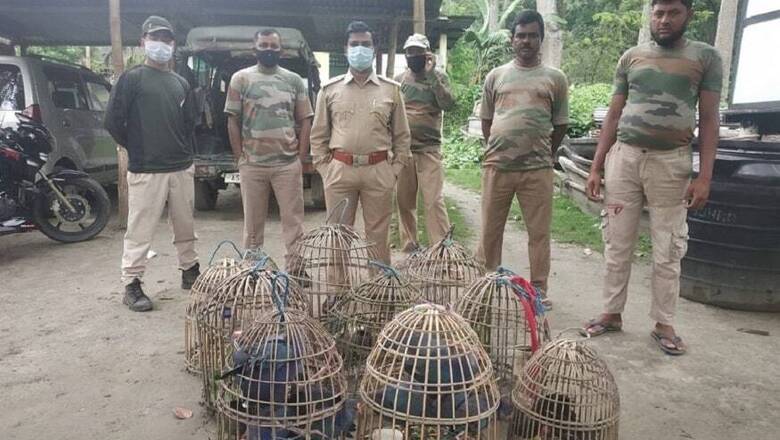
views
Since the nationwide lockdown was announced to curb the further spread of novel coronavirus, a sudden surge has been witnesses in the cases of illegal hunting as the animals and birds have stepped out of their natural habitats due to no disturbance by the people.
During an operation on May 14, forest officials under Laokhowa Wildlife Sanctuary in Assam’s Nagaon district have rescued 13 purple moorhens trapped in cages and later released them in the forest.
“We seized 13 moorhens during a night operation at Dagaon village of Juria block in Nagaon district. One person was detained and fined Rs 20,000 for the crime. Last year, we rescued 19 birds. It has been reported that poaching of birds, especially water fowls is being done in different parts of Assam,” said Ranjith Ram, Divisional Forest Officer, Nagaon Wildlife Division.
He continued, “Trapping of birds has gone down drastically due to patrolling, but we presume that the lockdown could lead to increased attempts of poaching as more people are sitting at home and employment has also gone down. People are getting more into hunting as the migratory birds have also returned.”
The purple moorhen or purple swamphen (Porphyrio Porphiriyo) is an aquatic bird found in marshy lands and swamps throughout the country. In Assam, it is popularly known as ‘Kaamsorai’ – a domestic hen sized bird, purple in colour with a red patch on the head, red beak and red legs. Moorhen known to be a shy bird, immediately hides in bushes even at the slightest disturbance.
While poaching cases remain higher during the winter season, it shoots up during early winter when the migratory birds start to arrive. In a separate incident of poaching, the Nagaon forest division arrested nine persons, including children found involved in a crime. A number of poaching tools were seized during operations launched by the forest department that also does frequent patrolling in the vulnerable areas and village markets where the birds are often sold for a huge amount.
“Poaching continues because it is still lucrative. The investment in this type of poaching is very low – the birds are caught for self-consumption and also sold to others. The moorhens were sold in the market for Rs 10-15,000,” said Ram.
The birds are caught mostly in areas along the Brahmaputra dotted with numerous wetlands, large swathes of paddy fields and fisheries.
“Normally, bird calls are played using large speakers in the night near water bodies. The villagers also use trained birds to attract the wild birds. These birds are then trapped using nets, and in winter, the nets are often invisible due to fog,” he explained.
The Wildlife Division of Nagaon is planning to launch an awareness programme on moorhen conservation, followed by a special operation to prevent the crime in future.
Covid-19 lockdown affecting tourism and livelihood in Kaziranga
Coronavirus has affected the balance between people and wildlife. It has hammered the livelihood of those depended on tourism activities in national parks and wildlife sanctuaries.
A few days back, a rare one-horned rhino was killed as poaching attempts increase in one of India's best-known national parks during the coronavirus lockdown.
The lack of vehicles on the highway near Kaziranga National Park in Assam — home to the world's biggest population of one-horned rhinos — amid the lockdown has seen animals move towards the boundaries, making them vulnerable to poachers.
Hence, in a bid to save animals from poachers, over 1,600 forest personnel have been asked to keep a strict vigil in the park without any leave.
“The lockdown has been seen good for animals in Kaziranga as there are no humans and jeeps around. There is no disturbance, air or noise pollution. Recently, a rhino was killed and the incident happened after 13 months in the park. The probe is underway to nab the culprits,” said P Sivakumar, Director of Kaziranga National Park.
About 1.65 lakh domestic and foreign tourists visited Kaziranga this year. The revenue collected this year stands at Rs 4.75 crore, a loss of Rs 7 lakh than previous year.
An American tourist and his partner who had visited the national park in February as part of their Assam tour had tested positive for coronavirus in Bhutan.


















Comments
0 comment